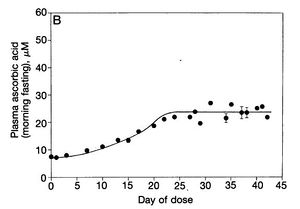Vitamin C deficiency
This article needs cleanup to meet MEpedia's guidelines. The reason given is: Grammar and image violating copyright. (unknown date) |
Hypovitaminosis C is a condition caused by a dietary lack of vitamin C (ascorbic acid) and is characterized by an increased bleeding tendency and impaired collagen synthesis.[1]
In hospital patients, it can be highly prevalent, but often unrecognized. Medical awareness of this potentially important disorder is hindered by the inability of most hospital laboratories to determine plasma Vitamin C concentrations. The availability of a simple, reliable method for analyzing plasma vitamin C could increase opportunities for routine plasma vitamin C analysis in clinical medicine.[2]
This is also described in[3] will give the following symptoms: lassitude, fatigue and irritability.
Evidence
The disease of terminal vitamin C deficiency – Scurvy – is first suspected on clinical grounds. The diagnosis is confirmed by documenting a plasma vitamin C concentration < 11.4 μmol/L and observing prompt clinical improvement after appropriate vitamin C provision. Scurvy is rare in the modern world, but hypovitaminosis C (plasma vitamin C concentration < 28.4 μmol/L ) or marginal vitamin C deficiency (plasma vitamin C concentration < 28.4 μmol/L but > 11.4 μmol/L ) is not. Hypovitaminosis C occurs in ~ 10% of the general population , in ~ 30 % of cigarette smokers and ~ 60% of acutely hospitalized patients, in whom it could contribute to fatigue and mood disturbance, immune system dysfunction, impaired wound healing, the complex regional pain syndrome and the complications of cardiovascular disease.[2]
Cited from [3] : Subclinical Vitamin C Deficiency: Clinical Application. Six of seven volunteers noted mild but distinct fatigue and/or irritability at depletion, without scurvy. Symptoms disappeared within several days of the 30- or 60-mg daily dose. Although fatigue and irritability have myriad causes, vitamin C deficiency without scurvy should be an additional consideration. Since fatigue and irritability are common symptoms and were so easily reversible, physicians should ask patients with these symptoms about vitamin C ingestion from foods or supplements.
Blood test
The blood test procedure for Vitamin C deficiency is highly advanced.[3] A simpler but less accurate is proposed in [2]
Notable studies
- 1996, Vitamin C pharmacokinetics in healthy volunteers: evidence for a recommended dietary allowance[3] (Full Text)
See also
Learn more
References
- ↑ "Scurvy". radiopaedia.org. Cite has empty unknown parameter:
|dead-url=(help) - ↑ 2.0 2.1 2.2 Robitaille, Line; Hoffer, L John (April 21, 2016), "A simple method for plasma total vitamin C analysis suitable for routine clinical laboratory use", Nutrition Journal, 15 (40)
- ↑ 3.0 3.1 3.2 3.3 Levine, Mark; Conry-Cantilena, Cathy; Wang, Yaohui; Welch, Richard W.; Washko, Louis R.; Dhariwal; Park; Lazarev; Graumlich; King; Cantilena (1996), "Vitamin C pharmacokinetics in healthy volunteers: evidence for a recommended dietary allowance", Proc Natl Acad Sci U S A, 93 (8): 3704-9


